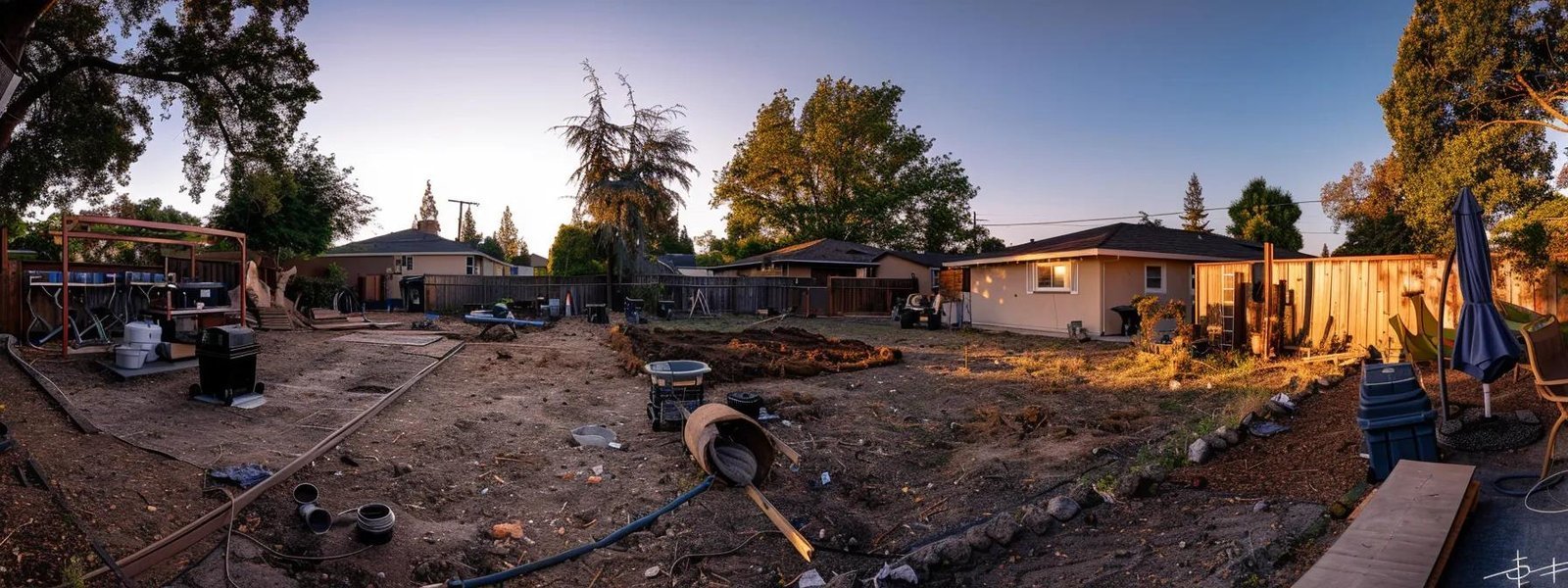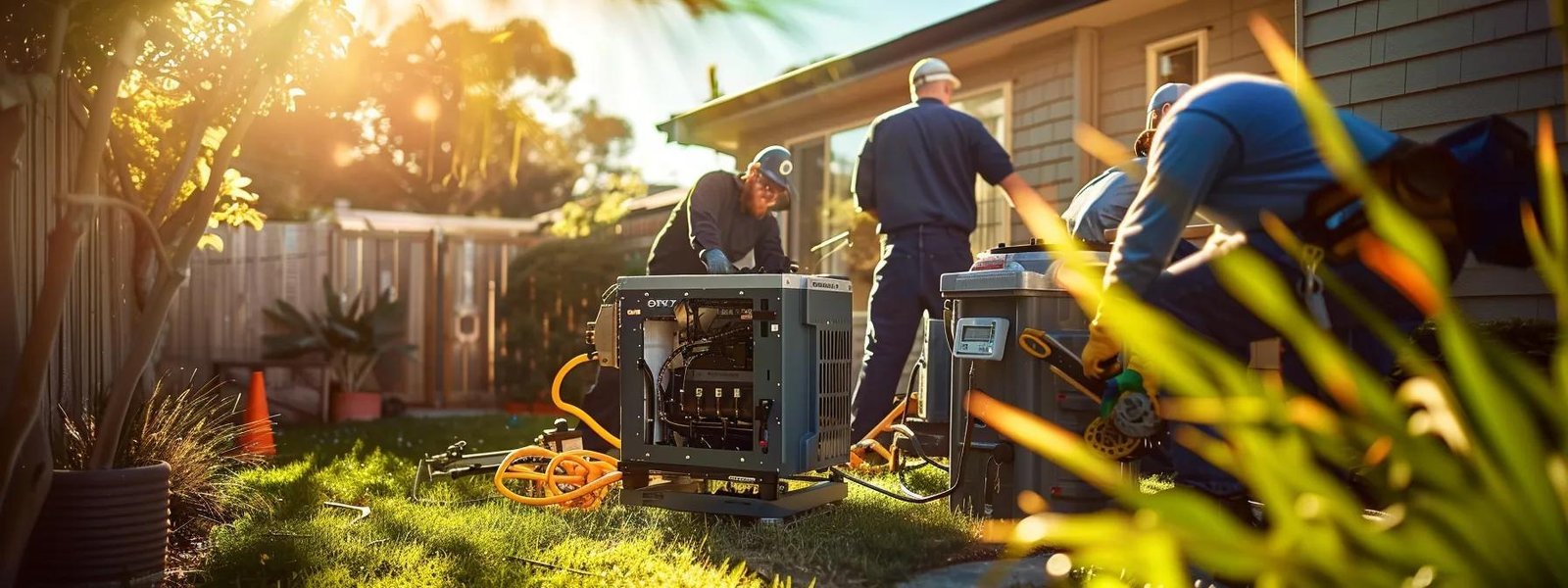
Are you worried about losing power during a storm or outage? Many homeowners face this issue, making generator installation a crucial consideration. This guide will help you find local generator installation experts, evaluate their services, and understand the installation process. By reading this content, you will learn how to ensure a reliable power supply for your home, whether through a commercial generator or a natural gas option. Addressing these concerns will help you make informed decisions and keep your home safe and functional.

Recognizing the risks of DIY installation is crucial when considering standby generator installation. Hiring licensed generator services ensures that a qualified technician handles the installation and performs electrical diagnostics, reducing the chance of errors. Additionally, professional installation guarantees compliance with local electrical codes, providing peace of mind and safety during emergencies. Understanding these factors highlights the importance of choosing expert services for generator installation.
DIY installation of a backup generator can lead to significant risks for customers. Without the expertise of professional generator installers, mistakes can occur that may compromise safety and functionality. Additionally, improper installation can result in costly generator maintenance issues down the line, making it essential to rely on qualified generator installation services to ensure a safe and effective setup.
Hiring licensed installation services for a backup generator offers numerous advantages that ensure safety and efficiency. Professionals bring expertise in handling complex systems, such as coolant management and sump pump integration, which are critical for optimal performance. Additionally, they ensure that all lighting and electrical connections comply with local codes, reducing the risk of future issues and providing homeowners with peace of mind during power outages:
Ensuring compliance with local electrical codes is a critical aspect of generator installation. Licensed professionals conduct thorough inspections to verify that the installation meets all safety standards, including proper connections for propane generators and appropriate wattage requirements. Homeowners should always check their zip code regulations, as local codes can vary significantly, impacting the overall safety and functionality of the generator system.

Finding local generator installation experts involves several key steps. Homeowners can utilize online directories and reviews, such as Angi, to identify qualified professionals. Seeking recommendations from neighbors and friends can provide trusted insights. It’s also essential to check for professional certifications and licenses, as well as to compare service offerings and project costs for standby generator installation services. Each of these steps ensures a reliable and safe installation process.
Utilizing online directories and reviews is an effective way for homeowners to find qualified professionals for home generator installation. Websites like Angi provide valuable insights into local generator installation experts, showcasing customer feedback on their experiences with backup generator services. By reading reviews and comparing ratings, homeowners can make informed decisions, ensuring they choose a reliable contractor for their standby generators and emergency service needs.
Seeking recommendations from neighbors and friends can be an effective way to find local generator installation experts. Personal referrals often come with verified reviews, providing insights into the quality of service and reliability of the professionals. Homeowners can ask about their experiences with installation, repair services, and even related systems like air conditioning and pump installations, ensuring they choose a contractor who meets their specific needs:
Checking professional certifications and licenses is essential when selecting a generator installation expert. Licensed professionals possess the necessary knowledge and training to ensure safe and effective installation, which is crucial during a power outage. Additionally, verifying these credentials can provide homeowners with peace of mind, knowing that their investment is protected under warranty and that the installation meets safety standards.
When comparing service offerings and pricing for generator installation, homeowners should consider the specific needs of their property, such as the size of the basement and the type of home generator required. Different generator installation companies may offer various packages that include installation, maintenance, and warranty options. By obtaining quotes from multiple electricians, homeowners can ensure they receive competitive pricing while also evaluating the quality of service and expertise provided by each company.

When evaluating potential installation professionals for generator services, homeowners should consider several key factors. First, asking questions about their experience with specific generator brands can reveal their expertise. Understanding their installation process is crucial to minimize downtime during setup. Additionally, verifying insurance and warranty coverage ensures protection against unforeseen issues, such as flood damage or electrical failures.
When evaluating potential installation professionals for generator services, homeowners should ask specific questions to gauge the installer’s expertise and reliability. Inquire about their experience with the type of generator being considered, as well as their familiarity with local electrical codes. Additionally, understanding their installation process and timeline can help ensure a smooth setup, minimizing any disruptions during the installation phase:
When assessing potential installation professionals, homeowners should inquire about their experience with specific generator brands. This knowledge is vital, as different brands may have unique installation requirements and features. A qualified installer will be familiar with the nuances of various models, ensuring a seamless setup and optimal performance for the homeowner’s chosen generator:
Understanding the installation process is essential for homeowners seeking generator installation services. A qualified installer will typically begin with a site assessment to determine the best location for the generator, considering factors such as accessibility and local regulations. They will then outline the steps involved, including electrical connections, fuel supply setup, and testing the system to ensure it operates correctly before finalizing the installation:
Verifying insurance and warranty coverage is essential when selecting a generator installation professional. Homeowners should ensure that the installer carries liability insurance to protect against potential damages during the installation process. Additionally, confirming warranty coverage on both the installation work and the generator itself provides peace of mind, ensuring that any future issues are addressed without incurring extra costs:

Preparing for generator installation services involves several key steps to ensure a smooth process. Homeowners should start by determining the appropriate generator size for their home, which is crucial for meeting energy needs. Planning the installation site is also essential, as it affects accessibility and compliance with local regulations. Scheduling a home assessment with the installer allows for a thorough evaluation of the property, while understanding permit requirements ensures adherence to local codes. Each of these steps plays a vital role in achieving a successful generator installation.
Determining the appropriate generator size for a home is essential to ensure that it meets energy needs during power outages. Homeowners should consider the total wattage of the appliances and systems they wish to power, including heating, cooling, and essential electronics. Consulting with a professional generator installer can provide valuable insights and calculations to select the right generator size, ensuring optimal performance and reliability:
Planning the installation site for a generator is a critical step that ensures optimal performance and compliance with local regulations. Homeowners should choose a location that is easily accessible for maintenance and repairs while also considering factors such as distance from windows and doors to minimize noise and exhaust exposure. Consulting with a professional installer can provide valuable insights into the best placement for the generator, ensuring it operates safely and efficiently:
Scheduling a home assessment with the generator installer is a crucial step in the generator installation process. During this assessment, the installer evaluates the property to determine the best location for the generator, ensuring it meets local regulations and accessibility needs. This professional insight helps homeowners understand their energy requirements and allows for a tailored installation plan that maximizes efficiency and safety.
Understanding permit requirements is essential for homeowners planning generator installation. Local regulations often dictate specific permits needed for safe and compliant installation, which can vary by location. Engaging a licensed generator installation expert ensures that all necessary permits are obtained, helping to avoid potential fines and ensuring the installation meets safety standards. This proactive approach not only streamlines the installation process but also provides peace of mind, knowing that the generator will operate safely and efficiently in accordance with local laws.

On installation day, homeowners can expect a structured process that includes safety protocols followed by professionals, ensuring a secure environment. The installation will also feature testing and demonstration of the new generator, allowing homeowners to understand its operation. Finally, thorough inspections and approvals will confirm that everything meets local regulations, providing peace of mind and confidence in the new system.
On installation day, homeowners can expect a well-organized process led by experienced professionals. The team will arrive prepared to follow safety protocols, ensuring a secure environment throughout the installation. After setting up the generator, they will conduct thorough testing and provide a demonstration, allowing homeowners to understand how to operate the system effectively. This structured approach not only guarantees compliance with local regulations but also instills confidence in the reliability of the newly installed generator.
During the generator installation process, professionals adhere to strict safety protocols to ensure a secure environment for both the team and the homeowner. This includes wearing appropriate personal protective equipment (PPE), conducting thorough site assessments, and following local electrical codes. By prioritizing safety, licensed installers minimize risks associated with generator setup, providing homeowners with confidence in their new system:
After the installation of a new generator, the testing and demonstration phase is crucial for ensuring that the system operates correctly. Professionals will run the generator through various scenarios to confirm its performance under load, checking for any potential issues. This hands-on demonstration allows homeowners to understand how to operate the generator effectively, ensuring they are prepared for any power outages that may occur.
Final inspections and approvals are critical steps in the generator installation process, ensuring that everything meets local safety standards and regulations. Licensed professionals conduct thorough checks of the installation, verifying that all connections are secure and compliant with electrical codes. This final review not only confirms the generator’s readiness for operation but also provides homeowners with the assurance that their investment is safe and reliable for future use during power outages.

Maintaining a generator post-installation is essential for ensuring its longevity and reliability. Homeowners should set up regular maintenance with professionals to keep the system in optimal condition. Additionally, implementing tips for extending the life of the generator, recognizing when to call for repairs, and keeping up with warranty guidelines are crucial steps. Each of these aspects plays a vital role in maximizing the generator’s performance and safeguarding the investment.
Setting up regular maintenance with professionals is essential for ensuring the longevity and reliability of a generator. Homeowners should schedule routine check-ups with licensed technicians who can perform necessary inspections, oil changes, and system tests. This proactive approach not only helps identify potential issues early but also ensures that the generator operates efficiently when needed most:
To extend the life of a generator, homeowners should prioritize regular maintenance and inspections. Scheduling routine check-ups with licensed professionals can help identify potential issues before they escalate, ensuring the generator operates efficiently when needed. Additionally, keeping the generator clean and ensuring proper ventilation can prevent overheating and prolong its lifespan:
Homeowners should be vigilant in recognizing when to call for generator repairs to ensure their system remains reliable. Signs such as unusual noises, failure to start, or inconsistent power output indicate that professional attention is needed. Addressing these issues promptly with licensed generator installation experts can prevent further damage and ensure the generator operates efficiently during power outages.
Keeping up with warranty guidelines is essential for homeowners to protect their investment in a generator. Regular maintenance, as specified in the warranty, ensures that the generator operates efficiently and remains covered for repairs. Homeowners should document all service appointments and follow the manufacturer’s recommendations to avoid voiding the warranty, providing peace of mind during power outages.
Finding local generator installation experts is crucial for ensuring a safe and efficient setup that meets all local regulations. Professional installers bring the necessary expertise to avoid the risks associated with DIY installations, providing peace of mind during power outages. Homeowners should prioritize checking certifications, comparing service offerings, and scheduling assessments to secure reliable installation services. By taking these steps, homeowners can protect their investment and ensure their generator operates effectively when needed most.


